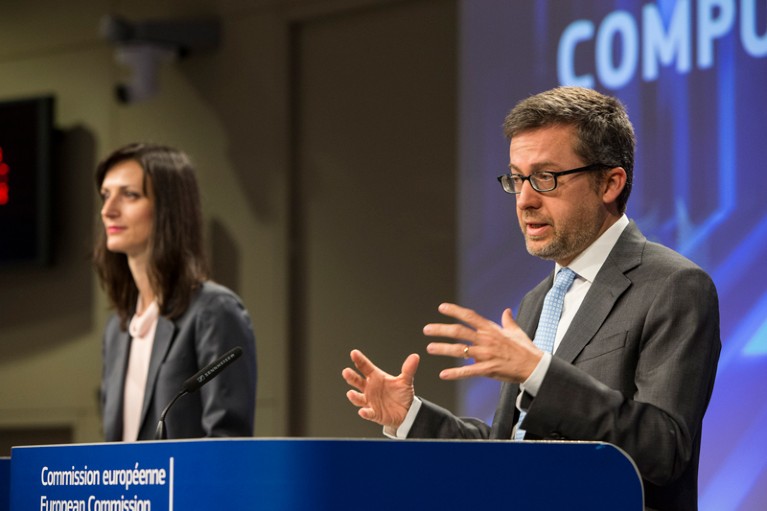
Carlos Moedas (right) passes the budget baton to Mariya Gabriel.Credit: Lukasz Kobus/European Union
Carlos Moedas was little known outside Portugal when he took over as the European Union’s research and innovation chief in 2014.
Now, at the end of his tenure, that is no longer the case. In five years, the engineer-turned-banker-turned politician has demonstrated thoughtful advocacy for research. He has listened to researchers and delivered — except on one issue where it really matters.
The funding settlement for Horizon Europe, the next research framework programme for all EU member states, has hit a roadblock. Moedas’s successor, Mariya Gabriel, and Europe as a whole must work hard to fight cuts and potential delays to its start.
On the positive side of the ledger, it is because of Moedas that around €9 billion (US$10 billion) — around one-tenth of the next round of European research funding — will be set aside for large collaborations in five global challenges or ‘missions’ — in climate change, cancer, oceans, smart cities, and soil and food. This was an idea that Moedas adopted after discussions with researchers, notably the innovation economist Mariana Mazzucato.
But a European research commissioner’s core job — some would argue the most important one — is to protect the budget. Earlier this month, negotiations between EU member states on the next seven-year budget cycle (for 2021–27) stalled. The European Commission is asking for €1.135 trillion, including around €100 billion for research. Member states want to cut the total budget by between €35 billion and €85 billion. Facing such a shortfall, it isn’t uncommon for those in charge of setting budgets to look to research for cuts.
Protecting research needs firepower — it requires support from heads of government, and especially from national ministries of finance. Moedas and his boss, commission president Jean-Claude Juncker, should have assembled high-level support much earlier, before we got to this point. The responsibility for ensuring that research does not bear the brunt of any cuts now falls to Gabriel.
An added complication is that, under the incoming commission, the department for research and innovation is being merged with that for education, youth, sport and culture. This expanded department is called Innovation and Youth — ‘research’ has been lost from the title — and Gabriel will have extra, and possibly competing, priorities, one of which is a trebling of the budget for the student-exchange programme Erasmus+.
Moedas has been a popular commissioner, known as a team player and a conciliator — playing the ‘good cop’ to his former head of research Robert-Jan Smits’s ‘bad cop’ in budget discussions. Smits describes Moedas as “a genuine, nice person who doesn’t like to put people in an uncomfortable situation”. These are important qualities.
But the EU faces some significant challenges, and Gabriel will need to adopt a tougher persona. Economies are slowing; austerity has been painful and many governments want to spend more at home on social programmes. At the same time, budget planners will need to adjust for the potential absence of — or reduction in — the UK contribution to the EU.
If they want to see their EU research budgets protected, research organizations can help Gabriel by putting pressure on their national governments, especially finance ministries. Everyone needs to push harder to protect funding — so that the spirit and support that has helped make the EU a model for collaborative research can live on.

 Radical open-access plan could spell end to journal subscriptions
Radical open-access plan could spell end to journal subscriptions
 European Commission expands role of research chief
European Commission expands role of research chief
 Europe can build on scientific intuition
Europe can build on scientific intuition
 Nature’s 10: Ten people who mattered this year
Nature’s 10: Ten people who mattered this year








